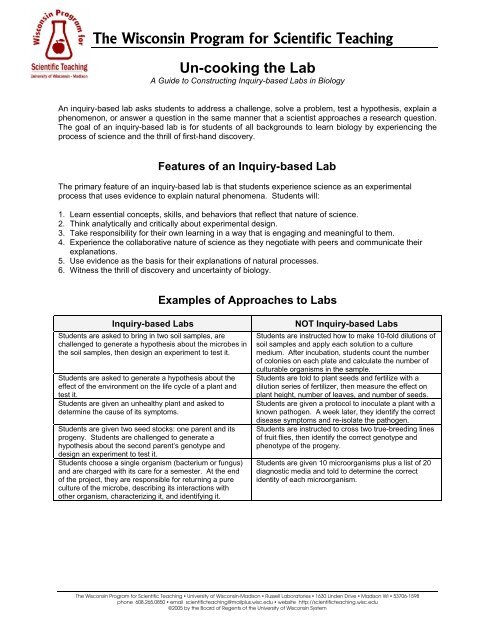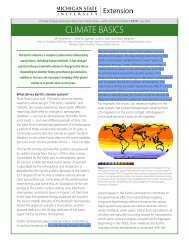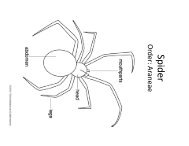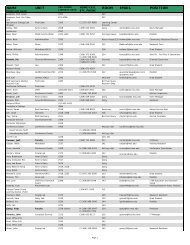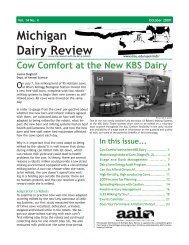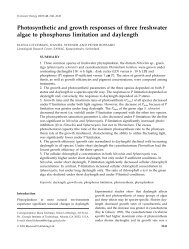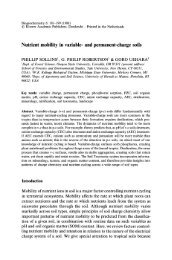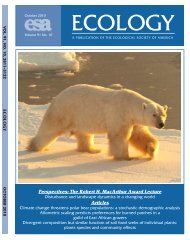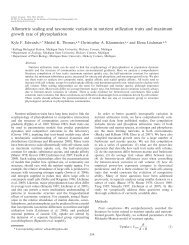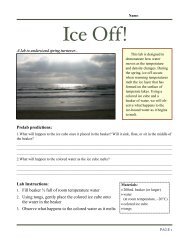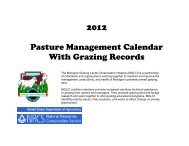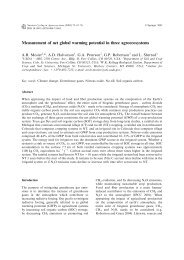Un-cooking the Lab - Yale Center for Scientific Teaching
Un-cooking the Lab - Yale Center for Scientific Teaching
Un-cooking the Lab - Yale Center for Scientific Teaching
You also want an ePaper? Increase the reach of your titles
YUMPU automatically turns print PDFs into web optimized ePapers that Google loves.
The Wisconsin Program <strong>for</strong> <strong>Scientific</strong> <strong>Teaching</strong><br />
<strong>Un</strong>-<strong>cooking</strong> <strong>the</strong> <strong>Lab</strong><br />
A Guide to Constructing Inquiry-based <strong>Lab</strong>s in Biology<br />
An inquiry-based lab asks students to address a challenge, solve a problem, test a hypo<strong>the</strong>sis, explain a<br />
phenomenon, or answer a question in <strong>the</strong> same manner that a scientist approaches a research question.<br />
The goal of an inquiry-based lab is <strong>for</strong> students of all backgrounds to learn biology by experiencing <strong>the</strong><br />
process of science and <strong>the</strong> thrill of first-hand discovery.<br />
Features of an Inquiry-based <strong>Lab</strong><br />
The primary feature of an inquiry-based lab is that students experience science as an experimental<br />
process that uses evidence to explain natural phenomena. Students will:<br />
1. Learn essential concepts, skills, and behaviors that reflect that nature of science.<br />
2. Think analytically and critically about experimental design.<br />
3. Take responsibility <strong>for</strong> <strong>the</strong>ir own learning in a way that is engaging and meaningful to <strong>the</strong>m.<br />
4. Experience <strong>the</strong> collaborative nature of science as <strong>the</strong>y negotiate with peers and communicate <strong>the</strong>ir<br />
explanations.<br />
5. Use evidence as <strong>the</strong> basis <strong>for</strong> <strong>the</strong>ir explanations of natural processes.<br />
6. Witness <strong>the</strong> thrill of discovery and uncertainty of biology.<br />
Examples of Approaches to <strong>Lab</strong>s<br />
Inquiry-based <strong>Lab</strong>s<br />
Students are asked to bring in two soil samples, are<br />
challenged to generate a hypo<strong>the</strong>sis about <strong>the</strong> microbes in<br />
<strong>the</strong> soil samples, <strong>the</strong>n design an experiment to test it.<br />
Students are asked to generate a hypo<strong>the</strong>sis about <strong>the</strong><br />
effect of <strong>the</strong> environment on <strong>the</strong> life cycle of a plant and<br />
test it.<br />
Students are given an unhealthy plant and asked to<br />
determine <strong>the</strong> cause of its symptoms.<br />
Students are given two seed stocks: one parent and its<br />
progeny. Students are challenged to generate a<br />
hypo<strong>the</strong>sis about <strong>the</strong> second parent’s genotype and<br />
design an experiment to test it.<br />
Students choose a single organism (bacterium or fungus)<br />
and are charged with its care <strong>for</strong> a semester. At <strong>the</strong> end<br />
of <strong>the</strong> project, <strong>the</strong>y are responsible <strong>for</strong> returning a pure<br />
culture of <strong>the</strong> microbe, describing its interactions with<br />
o<strong>the</strong>r organism, characterizing it, and identifying it.<br />
NOT Inquiry-based <strong>Lab</strong>s<br />
Students are instructed how to make 10-fold dilutions of<br />
soil samples and apply each solution to a culture<br />
medium. After incubation, students count <strong>the</strong> number<br />
of colonies on each plate and calculate <strong>the</strong> number of<br />
culturable organisms in <strong>the</strong> sample.<br />
Students are told to plant seeds and fertilize with a<br />
dilution series of fertilizer, <strong>the</strong>n measure <strong>the</strong> effect on<br />
plant height, number of leaves, and number of seeds.<br />
Students are given a protocol to inoculate a plant with a<br />
known pathogen. A week later, <strong>the</strong>y identify <strong>the</strong> correct<br />
disease symptoms and re-isolate <strong>the</strong> pathogen.<br />
Students are instructed to cross two true-breeding lines<br />
of fruit flies, <strong>the</strong>n identify <strong>the</strong> correct genotype and<br />
phenotype of <strong>the</strong> progeny.<br />
Students are given 10 microorganisms plus a list of 20<br />
diagnostic media and told to determine <strong>the</strong> correct<br />
identity of each microorganism.<br />
The Wisconsin Program <strong>for</strong> <strong>Scientific</strong> <strong>Teaching</strong> • <strong>Un</strong>iversity of Wisconsin-Madison • Russell <strong>Lab</strong>oratories • 1630 Linden Drive • Madison WI • 53706-1598<br />
phone 608.265.0850 • email scientificteaching@mailplus.wisc.edu • website http://scientificteaching.wisc.edu<br />
©2005 by <strong>the</strong> Board of Regents of <strong>the</strong> <strong>Un</strong>iversity of Wisconsin System
Inquiry-based <strong>Lab</strong>s: Constructing a Framework<br />
Questions to Consider<br />
Set Learning Goals<br />
What should students know,<br />
understand, or be able to do at <strong>the</strong><br />
end of <strong>the</strong> lab<br />
What methods, materials, or skills will<br />
students need to use<br />
What attitudes and experiences do<br />
you expect <strong>the</strong>m to have<br />
Represent <strong>the</strong> Nature of Science<br />
How do you expect students to<br />
approach <strong>the</strong> issue so <strong>the</strong>y think<br />
critically and analytically about<br />
experimental design<br />
How will <strong>the</strong> lab’s design foster<br />
collaboration and communication<br />
Engage Students in Learning<br />
What will be <strong>the</strong> “hook” <strong>for</strong> <strong>the</strong> lab that<br />
will engage students in learning so<br />
<strong>the</strong>y take responsibility <strong>for</strong> <strong>the</strong>ir own<br />
learning<br />
Assess Regularly and Often<br />
How will you gauge <strong>the</strong> students’<br />
understanding and encourage <strong>the</strong>m<br />
to give priority to explanations based<br />
on evidence How will <strong>the</strong>y gauge<br />
<strong>the</strong>ir progress toward <strong>the</strong> learning<br />
goals<br />
Be<strong>for</strong>e <strong>the</strong> lab: What do <strong>the</strong> students<br />
already know (or think <strong>the</strong>y know),<br />
and do what <strong>the</strong>y need to know<br />
What essential in<strong>for</strong>mation/skills do<br />
<strong>the</strong>y need be<strong>for</strong>e <strong>the</strong>y begin<br />
During <strong>the</strong> lab: How will you know if<br />
<strong>the</strong>y “get it” What guiding questions<br />
will focus <strong>the</strong>ir discussions on<br />
experimental evidence<br />
At <strong>the</strong> end of <strong>the</strong> lab: How will you<br />
know if <strong>the</strong>y have met <strong>the</strong> learning<br />
goals Are students giving priority to<br />
evidence in <strong>the</strong>ir explanations<br />
Examples of Phrasing and Techniques<br />
Examples of learning goals<br />
Science content:<br />
• “DNA is <strong>the</strong> hereditary material <strong>for</strong> all life.”<br />
• “Specific microbes cause specific diseases in plants and animals.”<br />
Experimental design:<br />
• “Experiments provide a test <strong>for</strong> a hypo<strong>the</strong>sis that observations alone<br />
cannot provide.”<br />
Techniques:<br />
• “Different sampling techniques detect different parts of a community.”<br />
• Let students know what materials are available.<br />
• Teach protocols on an as-needed basis.<br />
Attitudes:<br />
• “Students express interest in scientific research.”<br />
Example approaches that represent <strong>the</strong> nature of science<br />
• “Design an experiment to test whe<strong>the</strong>r…”<br />
• “Design an experiment to test <strong>the</strong> effect of…”<br />
• “It is your job to determine how to characterize…”<br />
• “Propose a hypo<strong>the</strong>sis about [a phenomenon] and design an<br />
experiment to test it.”<br />
Example approaches to foster collaboration and communication<br />
• “Work as groups to ___ <strong>the</strong>n write individual reports in your own<br />
words.”<br />
• “Your group will present ___ to <strong>the</strong> class.”<br />
• “Toge<strong>the</strong>r, decide on how you plan to ___ and justify why.”<br />
• Recent research finding<br />
• Historical discovery<br />
• Contrasting viewpoints<br />
• Newspaper article<br />
• Issue raised in <strong>the</strong> course<br />
Be<strong>for</strong>e <strong>the</strong> lab:<br />
• Students answer brief questions about a textbook or web-based<br />
reading.<br />
• Students participate in an active learning exercise in lecture.<br />
• Students submit a paragraph online about <strong>the</strong>ir current attitudes<br />
toward <strong>the</strong> issue.<br />
• Students ask questions and brainstorm potential answers about <strong>the</strong><br />
issue and in<strong>for</strong>mation presented.<br />
During <strong>the</strong> lab:<br />
• Instructor asks guiding questions: “What’s your hypo<strong>the</strong>sis”<br />
”Tell me how your experiment tests it.”<br />
”Do you think <strong>the</strong> data explain ___”<br />
• Student groups share hypo<strong>the</strong>ses on board.<br />
• Entire class justifies what data to collect, and when and how to collect<br />
it.<br />
At <strong>the</strong> end of <strong>the</strong> lab:<br />
• Individual lab report<br />
• Group presentation<br />
• Grant proposal<br />
• Exam/quiz that applies knowledge and skills to a new scenario<br />
• Questions to assess attitudes about <strong>the</strong> experience and group<br />
collaboration<br />
The Wisconsin Program <strong>for</strong> <strong>Scientific</strong> <strong>Teaching</strong> • <strong>Un</strong>iversity of Wisconsin-Madison • Russell <strong>Lab</strong>oratories • 1630 Linden Drive • Madison WI • 53706-1598<br />
phone 608.265.0850 • email scientificteaching@mailplus.wisc.edu • website http://scientificteaching.wisc.edu<br />
©2005 by <strong>the</strong> Board of Regents of <strong>the</strong> <strong>Un</strong>iversity of Wisconsin-Madison
Inquiry-based <strong>Lab</strong>s: Flow of Activities in <strong>the</strong> Classroom<br />
START<br />
DURING THE LAB<br />
END<br />
Prior knowledge<br />
What do <strong>the</strong> students already<br />
know (or think <strong>the</strong>y know)<br />
What essential in<strong>for</strong>mation or<br />
skills do <strong>the</strong>y need be<strong>for</strong>e <strong>the</strong>y<br />
begin<br />
What misconceptions might <strong>the</strong>y<br />
have about this topic<br />
Engagement<br />
What is <strong>the</strong> “hook” that will<br />
engage students in learning<br />
Inquiry challenge<br />
What challenge will <strong>the</strong> students<br />
address<br />
The nature of science<br />
How will <strong>the</strong> lab experience<br />
mirror scientific research and<br />
encourage students to use<br />
evidence as <strong>the</strong> basis <strong>for</strong> <strong>the</strong>ir<br />
explanations<br />
What methods, materials, or<br />
skills will students need to use<br />
What guiding questions will<br />
focus <strong>the</strong>ir discussions on<br />
experimental design and<br />
evidence<br />
Learning goals<br />
What should students know,<br />
understand, and be able to do at<br />
<strong>the</strong> end of <strong>the</strong> lab<br />
How will you find out what<br />
students already know (or<br />
think <strong>the</strong>y know) and what<br />
<strong>the</strong>y need to know be<strong>for</strong>e <strong>the</strong>y<br />
begin<br />
How will you determine<br />
whe<strong>the</strong>r students are using<br />
evidence as <strong>the</strong> basis <strong>for</strong> <strong>the</strong>ir<br />
explanations<br />
How will you know whe<strong>the</strong>r<br />
students have met <strong>the</strong><br />
learning goals<br />
The Wisconsin Program <strong>for</strong> <strong>Scientific</strong> <strong>Teaching</strong> • <strong>Un</strong>iversity of Wisconsin-Madison • Russell <strong>Lab</strong>oratories • 1630 Linden Drive • Madison WI • 53706-1598<br />
phone 608.265.0850 • email scientificteaching@mailplus.wisc.edu • website http://scientificteaching.wisc.edu<br />
©2005 by <strong>the</strong> Board of Regents of <strong>the</strong> <strong>Un</strong>iversity of Wisconsin-Madison
<strong>Scientific</strong> <strong>Teaching</strong><br />
<strong>Teaching</strong> goals<br />
• Did <strong>the</strong> process go as you had planned<br />
• Do <strong>the</strong> assessments provide you with data about your teaching<br />
o What worked well What didn’t What evidence do you have<br />
o What would you do differently next time, and why<br />
o What new evidence would you like to ga<strong>the</strong>r next time<br />
• Do <strong>the</strong> learning goals of <strong>the</strong> lab reflect <strong>the</strong> nature of science<br />
o Are students expected to base <strong>the</strong>ir explanations on evidence<br />
o Are students expected to work collaboratively and build communications skills<br />
• Do <strong>the</strong> activities and assessments align with <strong>the</strong> learning goals<br />
• Does your teaching approach account <strong>for</strong> <strong>the</strong> diversity represented by your students<br />
Learning goals<br />
• Did students meet <strong>the</strong> learning goals<br />
• Did students have <strong>the</strong> opportunity to gauge <strong>the</strong>ir progress toward <strong>the</strong> learning goals at multiple<br />
points during <strong>the</strong> lab<br />
References and Fur<strong>the</strong>r Reading<br />
1. DiPasquale, D. M., C. L. Mason, and F. W. Kolkhorst. 2003. Exercise in Inquiry: Critical thinking<br />
in an inquiry-based exercise physiology laboratory course. Journal of College Science <strong>Teaching</strong><br />
32:388.<br />
2. Handelsman, J., B. Houser, and H. Kriegel. 1997. Biology Brought to Life: A guide to teaching<br />
students to think like scientists. McGraw Hill.<br />
3. Keefer, R. 1999. Criteria <strong>for</strong> designing inquiry activities that are effective <strong>for</strong> teaching and learning<br />
science concepts. Journal of College Science <strong>Teaching</strong> 28:159.<br />
4. Kolkhorst, F. W., C. L. Mason, D. M. DiPasquale, P. Patterson, and M. J. Buono. 2001. An<br />
inquiry-based learning model <strong>for</strong> an exercise physiology laboratory course. Advances in<br />
Physiology Education 25:117.<br />
5. Luns<strong>for</strong>d, E. 2003. Inquiry in <strong>the</strong> Community College Biology <strong>Lab</strong>: A research report and a model<br />
<strong>for</strong> making it happen. Journal of College Science <strong>Teaching</strong> 32:232-235.<br />
6. National Research Council. 2000. Inquiry and <strong>the</strong> National Science Education Standards: A guide<br />
<strong>for</strong> teaching and learning. National Academy Press, Washington DC.<br />
7. Thier, H. D. 2001. Developing Inquiry-based Science Materials: A guide <strong>for</strong> educators. Teachers<br />
College Press, New York.<br />
8. Volkmann, M. J., and S. K. Abell. 2003. Rethinking <strong>Lab</strong>oratories: Tools <strong>for</strong> converting cookbook<br />
labs into inquiry. The Science Teacher 70:38.<br />
The Wisconsin Program <strong>for</strong> <strong>Scientific</strong> <strong>Teaching</strong> • <strong>Un</strong>iversity of Wisconsin-Madison • Russell <strong>Lab</strong>oratories • 1630 Linden Drive • Madison WI • 53706-1598<br />
phone 608.265.0850 • email scientificteaching@mailplus.wisc.edu • website http://scientificteaching.wisc.edu<br />
©2005 by <strong>the</strong> Board of Regents of <strong>the</strong> <strong>Un</strong>iversity of Wisconsin System


